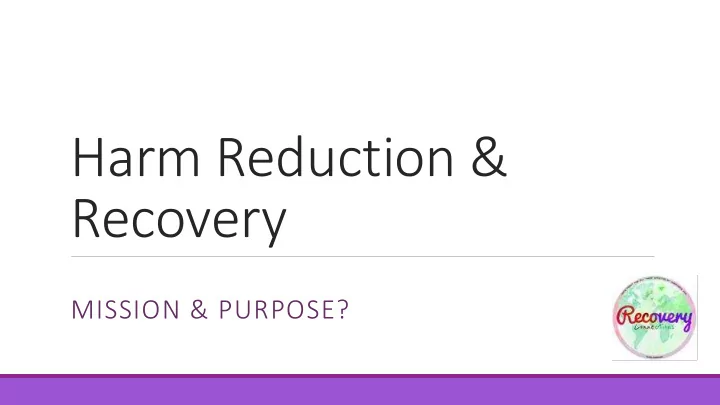

Harm Reduction & Recovery MISSION & PURPOSE?
Who are Recovery Connections? A peer led organisation which means 80% of our workforce are in recovery from addiction or family recovery from a significant other’s addiction. We are vulnerable, authentic, genuine, (sometimes messy) team of professionals. We operate on a value base of honesty, openness, gratitude and giving. Our culture is trauma informed, none shaming, acceptance, supportive, self managing and celebratory through community connection.
What do we do? Inspire hope – visible proof that change is possible. Educate – offer a programme of recovery, teach wellbeing & resilience principles and OCN accredited qualifications. Coach – goal setting, accountability, self reliance, problem solving. Mentor – support & model life in recovery, facilitate into mutual aid. We do this as many times as the person has the desire to change. We don’t see failure, we see opportunity. We support and celebrate all pathways of recovery Harm reduction is our number one priority and is achieved through partnership approaches and good working relationships.
Peer led recovery working alongside harm reduction We have a daily presence within Foundations. Whether it’s a member of the team preparing someone for rehab, an Ambassador showing recovery is possible or facilitating a SMART Recovery meeting, we ensure we are available for those crucial opportunistic encounters. It works because as organisations we respect the role we all play in reducing harm and saving lives.
The journey not the destination We don’t force recovery or believe everybody should be coerced into it. We do believe everyone should be given the opportunity to achieve it (if not abstinence - medically assisted recovery) We hold the aspiration for them until they can hold it for themselves. Preparation prior to rehab is key, there should be no surprises. 24 weeks abstinence based residential rehab or daily attendance increases risk of DRD. We need to be responsive to relapse in a non shaming way – no failures during rehab or post discharge. Community connection & peer support reduces risk.
Should completing rehab be the end point? A programme of recovery to remain abstinent may not be enough. We are taking away for some their survival tool, revealing trauma and mental health issues. Continuing care for co-occurring conditions is essential. To not meet this need is unethical. A benefit of providing residential rehab locally is the ability to embed the pathways and joint working. Structure and a sense of purpose is vital in early recovery. Mutual aid attendance and peer support outside of treatment in order to build an alternative peer group should be encouraged.
Visible recovery outside of the treatment system We need to continually challenge stigma in ways that reduces the shame of addiction. It’s a challenge in a world of reducing budgets. We are tackling it in a number of ways – training, free hot coffee bike, campus based recovery, Bar Zero, Fork in the Road, attendance at community events, business networks. It’s a vital component of what we do as a peer led charity. We all must step outside the walls of our agency and increase awareness to reduce stigma.
Personal Testimonies
Recommend
More recommend